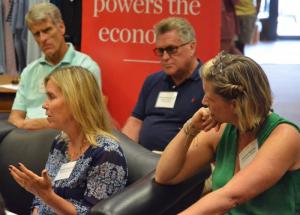During a roundtable discussion Aug. 21, Rehoboth business owners told Sen. Chris Coons they were glad President Donald Trump had delayed proposed tariffs, but a fear of the unknown continues to worry them. Then, as if on cue, a couple of days later the president escalated the trade war with China by tweeting about increasing tariffs already imposed and future tariffs.
It’s the anxiety associated with the president’s statements that continues to linger, said Dale Lomas, owner of Crosswinds Motel and Atlantic Liquors.
Coons was invited to Rehoboth by Trey Kraus, owner of Carlton’s clothing store in Rehoboth Beach and a member of the National Retail Federation. In July, Kraus was one of hundreds of small business owners who testified in Washington, D.C., about harm to small business the proposed tariffs will cause.
At the time, Kraus said the cost of the tariffs is not being borne by China, but by the American consumers. Tariffs have the potential to ruin Rehoboth, Kraus said, and this is something he doesn’t want to happen.
Rachel Webster, Rehoboth Toy & Kite owner, said this summer has been a little bit better than last summer, but that’s because the weather has cooperated this year, compared to last.
Webster said a significant number of the toys she buys for the store come from China, so a 25 percent tariff would be dramatic. The store is already competing with the Amazons of the world and the outlets, she said.
Susan Kehoe, Browseabout Books managing partner, said the profit margin on books is slim and any increase in cost makes it harder to sell them. She said there’s a supply chain issue also. A lot of books in color are printed in China because they have the ability to mass produce a product that’s difficult to print. Moving that supply chain would be complicated, she said.
“It’s not magically going to happen,” said Kehoe.
Business owners agreed one of the biggest challenges is finding a balance between passing the costs on to customers and decreasing expenses, which means hurting the employees.
“If we take it from the profit margin, it means less for our employees,” said Kehoe.
Lomas said uncertainty is affecting his costs. He buys mattresses for his hotel that come primarily from China. He said his supplier is hesitant to quote a price right now because he doesn’t know how much they’ll cost by the end of the year.
For the most part, Coons listened. He said he supports Trump’s opinion that China has long been stealing the intellectual property of companies from the United States, but he said he wouldn’t have gone the route of tariffs in an effort to force a change. Coons said he also would not have started a trade war with China by also increasing tariffs on a number of the United States’ strongest allies.
“There doesn’t seem to be a clear strategy,” said Coons. “It’s not impossible this won’t end well, but I’m not sure it’s going to.”
Coons said it appears to be a strategy focused on trying to hurt China, but in reality it’s the small businesses and local consumers who are paying the price.
“There seems to be a lack of strategy on where it ends and how it ends,” he said.
Chris Flood has been working for the Cape Gazette since early 2014. He currently covers Rehoboth Beach and Henlopen Acres, but has also covered Dewey Beach and the state government. He covers environmental stories, business stories and random stories on subjects he finds interesting, and he also writes a column called Choppin’ Wood that runs every other week. He’s a graduate of the University of Maine and the Landing School of Boat Building & Design.





















































